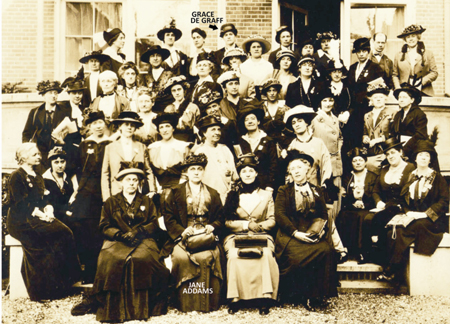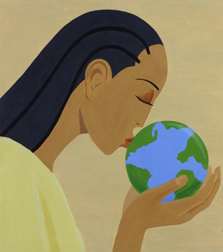|
Violence is not inevitable:
It is a choice
Big chain hotels in
major cities can throw up some unusual bed fellows. On an April morning
at the Novotel in The Hague, Netherlands, the lift was full of
grim-faced men all heading off to the 9th annual Global
Refining and
Petrochemical Summit at the convention centre next door. The oil
refinery business isn’t doing so well because of industry over-capacity
and environmental costs, so they were there to work out how to make more
money.
by Marion Bowman
By the evening, in the ebb and flow of arrivals and departures, a
group of cheerful British women filled the hotel foyer. They were
floristry students on a study tour, in Holland to visit the tulip
fields, observe flower auctions, visit growers and learn more about
flower arrangement.
Although neither group would have known it, they both had links to
another gathering, just down the road at The Hague’s famous Peace
Palace, home of the International Court of Justice.
Members of the world’s oldest international women’s peace movement
were meeting there to mark their organisation’s centenary.
|

Leaders of the Women’s International League for Peace and
Freedom who argued in favor of US participation in a
worldwide peace organization such as the League of Nations
at the end of the Great War (Library of Congress) |
On April 28, 1915, 1,136 women met in The Hague in an International
Women’s Congress to try to bring the First World War to a halt. It was a
war that was fuelled by competing imperialist ambitions for oil, a war
best remembered now through the symbol of one flower, the red poppy of
Flanders’ fields.
The women who met in 1915 failed in their objective. On the very day
they met, just 104 miles to the south, 122,000 men died or were wounded
on the sixth day of the Second Battle of Ypres, when a chemical weapon,
chlorine gas, was used for the first time in history. In total, 9
million combatants and 7 million civilians died during the conflict.
Several empires collapsed and the victors put in place a new world
order which is still playing out in pulsating circles of war and
violence.
But if the warmongers have kept going, so have the women
peace-makers. Major John McCrae wrote In Flanders Fields, the poem that
gives the red poppy its iconic power, after the death of a friend in the
Second Battle of Ypres on May 2, just days after the women’s 1915
Congress. In the final verse he urges:
Take up our quarrel
with the foe:
To you from failing
hands we throw
The torch; be yours to hold it high.
If ye break faith with us who die
We shall not sleep, though poppies grow
In Flanders fields.
The women of 2015 and of the intervening years have taken up the
quarrel and are holding high the torch, keeping faith with their
foremothers. One delegate in The Hague was Robin Lloyd, whose
grandmother Lola Maverick Lloyd was one of the Americans present in
1915. Down the generations and across the globe, the foe is militarism,
militarisation and war itself, and the torch illuminates a vision of the
impossibility of peace without the full participation of women in the
exercise of power.
WILPF has deep roots in the 19th century movements for equal
political rights and social justice. Helen Kay, WILPF’s historian,
records that the 1915 congress was originally intended to be an
international meeting in Berlin devoted solely to women’s suffrage. With
the outbreak of war it was cancelled. When it was re-convened in the
Netherlands, a neutral country, attendance was contingent on commitment
to two things: votes for women and the resolution of conflict through
peaceful means.
Men in power were alarmed and women’s patriotism, as they defined it,
was called into question. The 180 British women who applied for
passports in order to be able to attend were called ‘these dangerous
women’ by Winston Churchill, then First Lord of the Admiralty.
Only 24 were allowed to travel and only three managed to get to The
Hague. Some of the German women attending were imprisoned on their
return home.
This time, the constraints on women attending their Hague meeting are
not so very different.
Ten women from the Democratic Republic of Congo, half of their
delegation, were refused visas and one of the key figures in the
organisation, Joy Onyesoh of Nigeria, well travelled in Europe, may not
get to the Netherlands. She should be in The Hague now and is due to act
as a lead facilitator for WILPF.
Despite such perennial limitations and the power of the war-mongers,
the mood of many of the women is upbeat, their long history and
wide-ranging connections, of both people and ideas, a source of
inspiration and encouragement.
|

The women of 1915 created the
Women’s International League for Peace and Freedom (WILPF),
where for two weeks in April 2015
their successors from 36 countries met to finalise a new
manifesto against war for the 21st century. |
A group from Australia has travelled from Istanbul to The Hague
on a ‘peace train’, having meetings about peace-making along the
way, mirroring the peace train that went from Scandinavia to Beijing
in 1995 for the UN’s Fourth World Conference on Women.
Gisele Noublanche, the 86 year old President of WILPF’s French
section, who worked with children tortured during the Algerian war
of independence from France (1954 – 62), asked what has kept her in
the movement, says: ‘We must keep on resisting – that’s how we
advance. Is there anything else to do? We love life and want it to
continue the best it can be on this planet.’ Odile Hugonot Haber, a
nurse from the US, was originally involved in the student and worker
rebellions in Paris in 1968 then brought middle class doctors and
nurses together with workers in a centre for activists in San
Francisco before taking on the role of chair of WILPF US’s Middle
East committee.
Although the century since WILPF’s founding has seen war,
violence and conflict unimaginable even to those who witnessed the
mechanised carnage and mass slaughter of 1914-18, women around the
world continue to join the organisation. Cameroon is the latest
country to be represented, being endorsed as a new section.
‘There is peace in Cameroon,’ says Nathalie Wokam Foko, a 42 year
old who used to work in commerce and is now studying law to become a
magistrate. ‘But the peace hides something. There is poverty. Our
electoral system is not always good for everyone. And Boko Haram is
coming.
They are threatening our peace in the north and Seleka rebels
from Central African Republic are in the east. There are internally
displaced people.’ Wokam Foko says women in particular are victims
in this scenario, so must organise as women. ‘We can’t get to
conflict areas, so we must work together where we are and get
involved in peace processes and negotiations’.
Annie Matundu of WILPF’s Democratic Republic of Congo section,
who helped the Cameroon women connect with the global movement,
says: ‘Peace is in the middle of everything. Without peace nothing
else works.’
In 1948 WILPF was one of the first civil society organisations to
receive consultative status at the UN. Over 50 years later, in 2000,
WILPF reached a key moment in its history when the UN Security
Council adopted Resolution 1325, the international legal framework
that addresses not only the inordinate impact of war on women, but
also the pivotal role women should and do play in conflict
management, conflict resolution and sustainable peace.
Nevertheless, women continue to be excluded from participation in
peace processes, as international talks about the war in Syria show.
And this very week, with a humanitarian crisis involving hundreds of
desperate people dying in the Mediterranean Sea, the EU is being
asked to consider military action, as the Italian Prime Minister
Matteo Renzi frames the problem as a ‘war’ with human traffickers.
Gisele Noublanche says: ‘It is very important that women have a
vision of a world that is demilitarised’. Men too, for that vision
is in short supply, but without it the dying and horror will
continue. As WILPF’s manifesto for the 21st century, says: ‘Violence
is not inevitable. It is a choice….To pursue our task of ending war
we have to be able to imagine peace.’ It really is time the women
were heard and their vision shared.
In Flanders
fields the poppies blow
Between the
crosses, row on row,
That mark our place; and in the sky
The larks, still bravely singing, fly
Scarce heard amid the guns below.
(Marion Bowman was
Director of One World Media, and worked for many years in broadcast
journalism at Channel 4, ITV, and the BBC. She has written for
numerous publications including The Guardian, Sunday Times, Observer
and New Statesman) |

